May 16, 2025 | 10:34 GMT +7
May 16, 2025 | 10:34 GMT +7
Hotline: 0913.378.918
May 16, 2025 | 10:34 GMT +7
Hotline: 0913.378.918
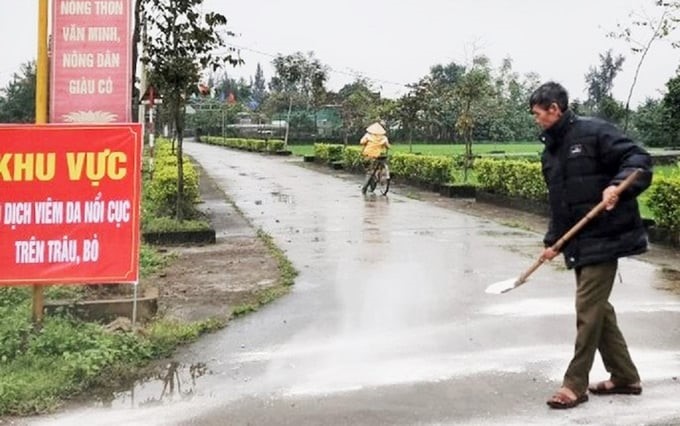
Lumpy skin disease on buffaloes and cows in Ha Tinh is developing complicatedly. Photo: TN.
At the end of January 2024, lumpy skin disease (LSD) rose in buffalo and cow herds in Tung Loc commune, Can Loc district, Ha Tinh province, and then Xuan Thanh commune (Nghi Xuan district) and Phu Luu communes (Nghi Xuan district), respectively, causing 40 diseased cows. Of which, four died and had to be destroyed.
According to Mr. Phan Van Thanh, Vice Head of the Department of Agriculture and Rural Development and Director of the Center for Science and Technology Application and Plant and Livestock Protection in Loc Ha district, on February 26, My Hoa village (Phu Luu commune) recorded a sick cow of a farming household. One day later, professional test results confirmed that this livestock had been infected with LSD.
"After having test results, the district directed Phu Luu commune to 'turn on' the mode of epidemic prevention and control at the highest level and urgently implement measures to block the source of infection and stamp out the epidemic, such as disinfection with lime powder and chemicals and setting up two warning points in the area.
The locality also requires livestock farmers to sign a commitment to quarantine farming of infected cattle for management at barns according to regulations; absolutely not grazing, slaughtering, or selling livestock; and not bringing susceptible cattle back to raise during an epidemic that has not passed for more than 21 days," Mr. Thanh said.
For areas threatened by the epidemic, Loc Ha district issued an official dispatch directing communes and towns to instruct livestock farmers on cleaning barns and taking good care of buffaloes and cows to have resistance. Organize information, disseminate, and guide people on proactively monitoring livestock with signs of being sick or suspected of being sick, promptly detecting, reporting to the authorities and veterinary agencies, and timely deploying measures to prevent and control epidemics.
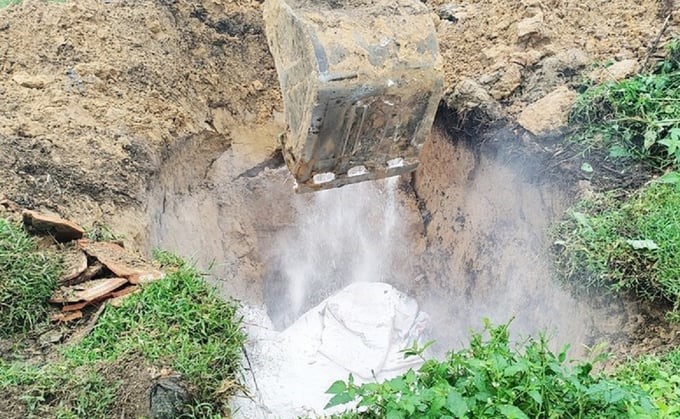
Four cows died and had to be destroyed, causing losses to farmers. Photo: TN.
Mr. Dang Thanh Binh, Vice Chairman of Tung Loc Commune People's Committee, said: "The total herd of buffaloes and cows in the whole commune currently has more than 600 heads. This is the investment of hundreds of households. To limit damage to people, in addition to instructions on implementing epidemic prevention and control solutions as recommended by specialized branches, during this first vaccination session in 2024, Tung Loc is determined to complete the goal of vaccination against LSD for 100% of the livestock herd.
Along with that, strengthen the management of animal and animal product trading, transporting, and slaughtering activities and veterinary practices in the area. Strictly handle the transportation, slaughter, trade of infected animals and animal products, and veterinary practices that spread epidemics.
In particular, local authorities call on people not to hide the epidemic and not to violate regulations in livestock farming, especially during times of high disease outbreaks in livestock herds like today.
In Tung Loc commune, Can Loc district, since January 24, 38 buffaloes and cows belonging to 28 households in 5 villages have been infected with lumpy skin disease, of which four were forced to be destroyed (the latest case on February 27 at Nam Tan Dan village).
Faced with the rapid spread and damage caused by the disease to livestock farmers, Tung Loc commune officials need to strictly manage sick buffaloes and cows in barns and not let livestock graze together when livestock have not recovered from clinical symptoms.
At the same time, assign unions to coordinate with village officials to go to every house to disseminate information on not increasing herds or buying new cows and buffaloes on this occasion. Organize hygiene and disinfection in epidemic areas, high-risk areas, and old outbreaks; set up signs for areas with LSD outbreaks and temporary epidemic checkpoints on inter-commune roads.
According to a household in Nam Tan Dan village, Tung Loc commune, with a LSD-infected cow that had to be destroyed, this disease is quite new to farmers, spreads quickly, and depletes the livestock's resistance. Therefore, after the cow had clinical symptoms, despite the village veterinary staff’s guidance on timely care and treatment solutions, the family's cow still died after 3 days of quarantine, with an estimated loss of more than VND 15 million.
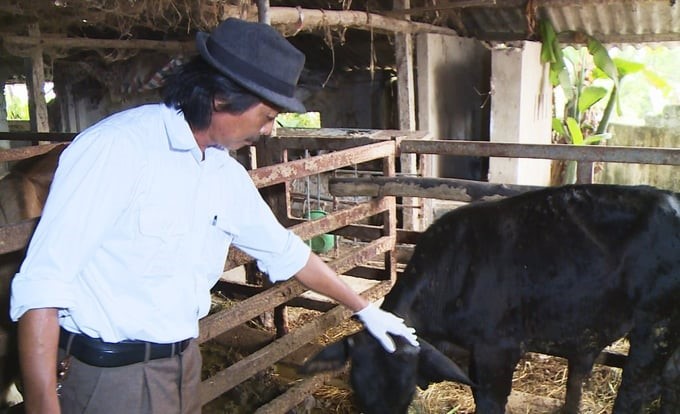
Veterinary staff inspect and guide livestock farmers in caring for and treating sick livestock. Photo: TN.
Currently, the weather in Ha Tinh is rainy and sunny; the temperature continuously increases and decreases, causing a reduction in the resistance of more than 235,000 cows and buffaloes. This is favorable for pathogens to develop. The protective immunity of the vaccines in the 2nd vaccination session in 2023 has expired. Transportation and trading activities to restock herds are increasing, so the risk of the LSD epidemic spreading in the coming time is very high.
Mr. Nguyen Hoai Nam, Vice Head of the Veterinary Management Department (Ha Tinh Sub-Department of Animal Husbandry and Veterinary Medicine), said that, in addition to the solutions that have been deployed recently, localities need to review the total cattle herd and urgently implement the first vaccination session in 2024 to effectively surround and suppress the epidemic.
“The Chairman of the Provincial People's Committee has just issued a document assigning departments, branches, and People's Committees of districts, cities, and towns to focus on implementing and directing the implementation of urgent tasks of epidemic prevention and control in livestock," said Mr. Nam.
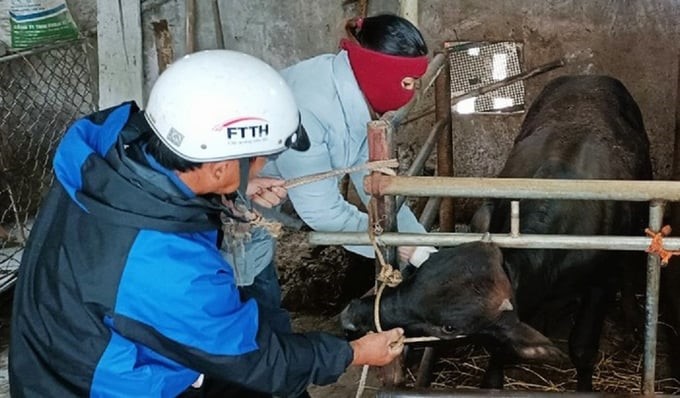
The Chairman of Ha Tinh Province requested localities finish the first vaccination session in 2024 before April 30. Photo: TN.
Accordingly, for localities with LSD outbreaks (Can Loc, Nghi Xuan, and Loc Ha), urgently mobilize resources to completely handle outbreaks, preventing the disease from breaking out and spreading on a large scale.
Organize a review and grasp the fluctuations in the total livestock herd; closely monitor for early detection and timely treatment of the epidemic; vaccinate against LSD to surround and control the epidemic by at least 80% of the total buffalo and cow herd subject to vaccination and complete before March 20, 2024.
Strictly manage diseased cattle, guide and support livestock farmers to care for and treat diseased cattle timely, and ensure and handle dead diseased cattle according to regulations.
People's Committees of districts, cities, and towns direct and rectify localities where vaccination rates are still low, especially for vaccines against canine rabies, lumpy skin disease on buffaloes and cows, and bird flu. Complete the vaccination session before April 30, 2024.
Along with that, assign professional staff to closely follow the grassroots to guide, direct, and closely monitor the epidemic situation and vaccination work on cattle and poultry for early detection, timely handling, and absolutely avoiding hiding the epidemic. Take samples for diagnosis and testing, and promptly handle infected cattle and poultry according to regulations.
Inform and disseminate to livestock owners and the community the risks and harmful effects of dangerous diseases on livestock, such as avian flu, African swine fever, lumpy skin disease, canine rabies, etc. Guide livestock farmers to proactively prevent and control dangerous infectious diseases in livestock herds.
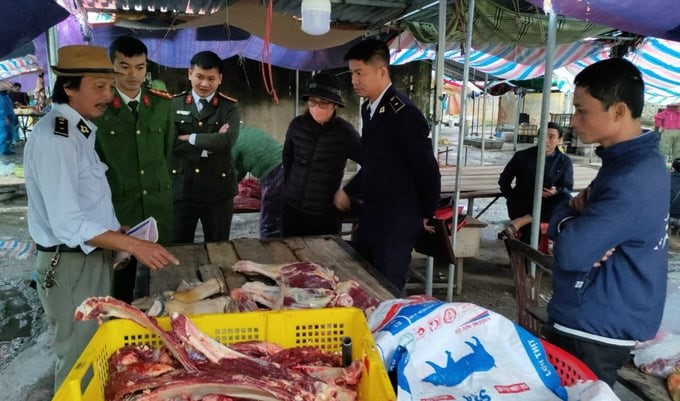
Strict management of trading and slaughtering activities is one of the solutions to limit the widespread spread of pathogens. Photo: TN.
Strengthen the management of animal and animal product trading, transporting, and slaughtering activities. Promptly detect, prevent, and strictly handle cases of illegal livestock transportation and slaughter, and dumping of livestock carcasses that spread diseases and pollute the environment. Strictly handle organizations and individuals that commit violations according to the provisions of the law.
Arrange funding, direct specialized agencies, and local authorities to implement the "Month of general cleaning, disinfection, and environmental detoxification, phase 1 of 2024" from March 1 to 31, 2024. Guide livestock farmers to implement hygiene and disinfection measures to ensure disease safety in livestock farming.
Translated by Huyen Vu Thu

(VAN) Vietnam's draft amendment to Decree No. 156 proposes a mechanism for medicinal herb farming under forest canopies, linking economic development to population retention and the sustainable protection and development of forests.

(VAN) In reality, many craft village models combined with tourism in Son La have proven effective, bringing significant economic benefits to rural communities.

(VAN) The international conference titled Carbon Market: International experiences and recommendations for Vietnam was successfully held recently in Ho Chi Minh City.

(VAN) According to the Project on rearranging provincial and communal administrative units, in 2025, the country will have 34 provinces/cities, 3,321 communes, wards, and special zones, and no district-level organization.
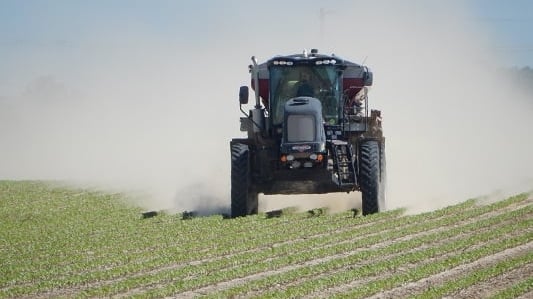
(VAN) The vice president of fertilizer with Stone X Group says the Trump administration’s tariffs are impacting fertilizer markets.
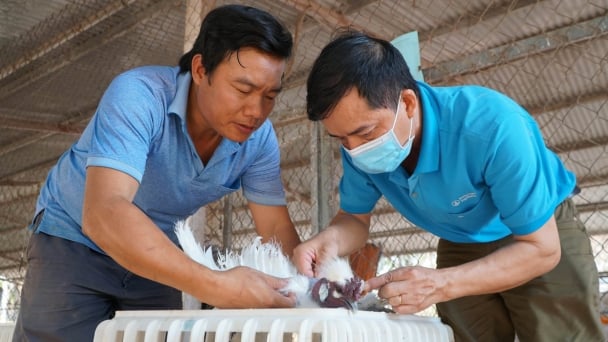
(VAN) Resolution 57 offers Vietnam a significant opportunity to narrow the global genetic technology disparity and convert its extensive genetic resources into commercial advantages.

(VAN) The Ministry of Agriculture and Environment will prioritize the implementation of five core and breakthrough solutions in science and technology, in addition to the seven groups of tasks identified in Decision No. 503.